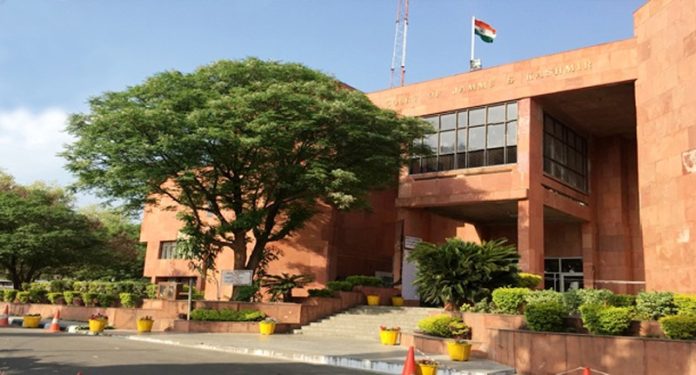*Sec 9 of Arbitration Act not meant to infuse life in contract
Implementation of AB-PMJAY–SEHAT in J&K UT
Mohinder Verma
JAMMU, Feb 6: High Court of Jammu & Kashmir and Ladakh has declined to grant relief to State Health Agency (SHA) against termination of contract by IFFCO–TOKIO General Insurance Company regarding implementation of Ayushman Bharat Pradhan Mantri Jan Arogya Yojana (AB-PMJAY) on the ground that insurance contract is not specifically enforceable under Section 14 of the Specific Relief Act and by way of a Section 9 petition under the Arbitration and Conciliation Act a party cannot seek specific performance of the contract.
The bench of Justice Wasim Sadiq Nargal, in a landmark judgment, further held that specific performance of determinable contracts is barred under Section 14 of Specific Relief Act, with a necessary corollary, even injunction is barred to be granted under Section 41(e) of the Specific Relief Act, 1963 wherever the contract is not specifically enforceable.
The insurance contract between the State Health Agency (SHA) and IFFCO-TOKIO General Insurance Company Limited was executed for a maximum period of three years commencing from 10th of March, 2022. Ordinarily, the contract agreement would have subsisted till 14th March, 2025, however, IFFCO TOKIO vide letter dated November 1, 2023 informed that they are not interested in further renewing the contract after the expiry of the present policy on March 14, 2024 as per Clause 9.1c of the contract agreement dated 10th March, 2022.
In response to the communication of the company, the Chief Executive Officer, State Health Agency, J&K vide communication dated November 3, 2023 addressed to the CEO/MD of the company requested them to continue as insurer in terms of the Memorandum of Understanding (MoU) signed between the parties. The General Manager of the company, in response to this request, informed the CEO, SHA that they have decided not to accord their consent for the renewal of the contract beyond March 14, 2024.
Subsequently, there were multiple correspondence exchanges between the SHA and the company, which stated that they are merely invoking clause 9.1 (c) of the contract agreement and in no way are in breach of the terms of the contract. The SHA then invoked Clause 41.3 of the contract agreement vide communication dated January 19, 2024 and served notice to the company for referring the matter to the Arbitral Tribunal.
Feeling aggrieved, the SHA filed petition under Section 9 of the Arbitration and Conciliation Act seeking interim protection from the High Court. It was prayed that company be directed to continue the contract up to 14.03.2025 in the interest of patient care and public at large.
After hearing Senior Additional Advocate General Mohsin S Qadri along with Maha Majeed, Assisting Counsel for the Government, Justice Wasim Sadiq Nargal observed, “as per the amended Section 10 of the Specific Relief Act, the courts no longer have discretionary powers under the Specific Relief Act while granting such a relief”.
“The insurance contract between the parties is likely to be terminated with effect from 14th March, 2024. Therefore, the issue which remains is whether the petitioner can seek specific performance of a contract which would no longer remain in existence after the said date”, High Court said and addressed this preposition by referring Section 14 of the Specific Relief Act, 1963 which deals with the contracts which are not specifically enforceable by a court.
About the question whether prima facie insurance is determinable or not, High Court said, “bare perusal of clause 9.1 (c) reveals that the renewal of insurance contract is subject to mutual agreement between both the parties. This clearly reflects that insurance contract is determinable in nature at the behest of one of the parties without any conditions attached. As such, the insurance contract is not specifically enforceable under Section 14 of the Specific Relief Act”.
Pointing towards Section 9 of the Arbitration and Conciliation Act, High Court said, “the scope of this Section does not envisage the restoration of the contract which stands terminated. It is not open to this court to restore the contract under Section 9 which is meant only for the sole purpose of preserving and maintaining the property in dispute and cannot be used to enforce the specific performance of a contract”.
“The law is settled that by way of a Section 9 petition under the Act, a party cannot seek specific performance of the contract. Since the insurance contract stands terminated, this court cannot intervene under Section 9 of the Arbitration and Conciliation Act to direct specific performance of the contract. Further, the specific performance of determinable contracts is barred under Section 14 of Specific Relief Act, with a necessary corollary, even injunction is barred to be granted under Section 41(e) of the Specific Relief Act, 1963 wherever the contract is not specifically enforceable”, Justice Nargal said.
With these observations, High Court dismissed the petition. However, High Court made it clear that the Arbitral Tribunal which is yet to be constituted, shall not be bound by any of the observations made in this order and the Arbitral Tribunal shall deal with the issues raised before it, even if they are the same as raised before this court, independently, without, being influenced by any of observation made in this order or the findings recorded by this court, prima facie.


